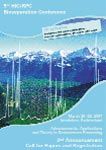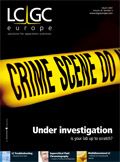5th HIC/RPC Bioseparation Conference
The 5th HIC/RPC Bioseparation Conference takes place at the Lindner Grand Hotel Beau Rivage Palace, Interlaken, Switzerland from 20–23 March 2007 and is co-ordinated by Tosoh Bioscience GmbH. It is designed to provide a forum for in-depth discussion on industrial downstream processing.
March 2007
20–23
Interlaken, Switzerland
The 5th HIC/RPC Bioseparation Conference takes place at the Lindner Grand Hotel Beau Rivage Palace, Interlaken, Switzerland from 20–23 March 2007 and is co-ordinated by Tosoh Bioscience GmbH. It is designed to provide a forum for in-depth discussion on industrial downstream processing.

Today's most challenging elements of modern downstream processing are the continuous increase in expression levels in fermentation and cell culture, the tough demands for purity and recovery of biopharmaceuticals and the highly competitive environment. The conference will present and discuss potential solutions for these problems using hydrophobic interaction and reversed-phase chromatography. The broad range of hydrophobic ligands coupled to polymeric or silica-based matrices provides new tools to develop high-quality products with high process throughput. The practical elements of chromatographic development and implementation will be balanced by panel and individual discussions about novel approaches and theories. This will provide a deeper understanding of molecular interactions and improved process design for hydrophobic interaction and reversed-phase purification steps.
The following areas will be covered in both the lectures and poster sessions:
- fundamentals and background of HIC/RPLC
- new concepts in column chromatography
- process application and optimisation
- novel stationary phases
- validation of chromatograaphy.
Interlaken can easily be reached by car or train. Direct rail links exist from Zurich and Geneva airports with trains leaving every hour.
For more details contact the Administrative Secretariat, 5th HIC/RPC Bioseparation Conference, c/o AKM Congress Service, Clarastrasse 57, Postfach, 4005 Basel, Switzerland, tel. +41 61 686 77 11, fax +41 61 686 77 88, e-mail: info@akm.ch website: www.hic-rpc.org
March–September 2007
Chromatography and Mass Spectrometry Training Courses
Various locations throughout the UK
Crawford Scientific is offering a number of practical training courses in chromatography and mass spectrometry throughout 2007.
These short interactive courses cover fundamental HPLC, LC troubleshooting and maintenance, fundamental GC, GC troubleshooting and maintenance, LC–MS, LC–MS interpretation, GC–MS, GC–MS interpretation, practical LC–MS, practical LC troubleshooting, practical HPLC method development, practical GC troubleshooting and practical GC–MS. Locations include Edinburgh, Manchester, Birmingham and Reading. The courses aim to teach the absolute essentials of each technique and use multi-media examples and tutorial exercises.
The courses are designed for practising analytical chemists who need a refresher, those new to analytical chemistry who require a solid grounding or for anyone wishing to gain an insight into important chromatographic and spectrometric techniques. They are limited to 20 delegates so that individuals may participate in tutorial and interactive sessions.
For further information and specific course details, please contact Crawford Scientific Ltd, Holm Street, Strathaven, Lanarkshire, Scotland ML10 6NB, tel. +44 135 7522961, fax +44 135 7522168, e-mail: enquiries@crawfordscientific.com website: www.crawfordscientific.com
20–22 March 2007
SEP 07
6ème congrès francophone de l'AfSep sur les sciences séparatives et les couplages Grenoble, France
Contact: Euradif, 52 chemin des jacinthes, 38330 Biviers, France
tel. +33 4 76 52 32 02
fax +33 4 76 52 24 50
e-mail: contact@sep07.com
website: www.sep07.com
22–23 March 2007
GPC/SEC Training Course: Theory and Practice Mainz, Germany
Contact: Jochen Leinweber, PSS Polymer Standards Service GmbH
tel. +49 6131 962 39 0
e-mail: JLeinweber@polymer.de
website: www.polymer.de
16–19 May 2007
3rd International Symposium of the Federation of European Societies on Trace Elements and Minerals Santiago de Compostela, Spain
Contact: Bermejo-Barrera Pilar, University of Santiago de Compostela, Faculty of Chemistry, Avenida de las Ciencias sn, Santiago de Compostela, 15782, Spain
tel. +34 6009 42346
fax +34 9815 95012
e-mail: pbermjo@usc.es
website: www.seqc.es/festemmeting/
3–6 June 2007
9th International Symposium on Advances in Extraction Technologies Ålesund, Norway
Contact: Professor Stig Pedersen-Bjergaard, School of Pharmacy, University of Oslo, PO Box 1068, Blindern, 0316 Oslo, Norway
tel. +47 228 56576, fax +47 228 54402
e-mail: stig.pedersen-bjergaard@farmasi.uio.no
website: http://extech07.hials.no/
26–29 August 2007
4th Nordic Separation Science Society International Conference Kaunas, Lithuania
Contact: Audrius MaruÖ³ka, Conference Chairman, Vytautas Magnus University, Vileikos st 8, LT-44404 Kaunas, Lithuania
tel. +37 03 732 7907, fax +37 03 732 7908
e-mail: a.maruska@gmf.vdu.lt
website: http://conference.vdu.lt/nosss4
Send your event details to fthomas@advanstar.com

Troubleshooting Everywhere! An Assortment of Topics from Pittcon 2025
April 5th 2025In this installment of “LC Troubleshooting,” Dwight Stoll touches on highlights from Pittcon 2025 talks, as well as troubleshooting advice distilled from a lifetime of work in separation science by LCGC Award winner Christopher Pohl.
This information is supplementary to the article “Accelerating Monoclonal Antibody Quality Control: The Role of LC–MS in Upstream Bioprocessing”, which was published in the May 2025 issue of Current Trends in Mass Spectrometry.











